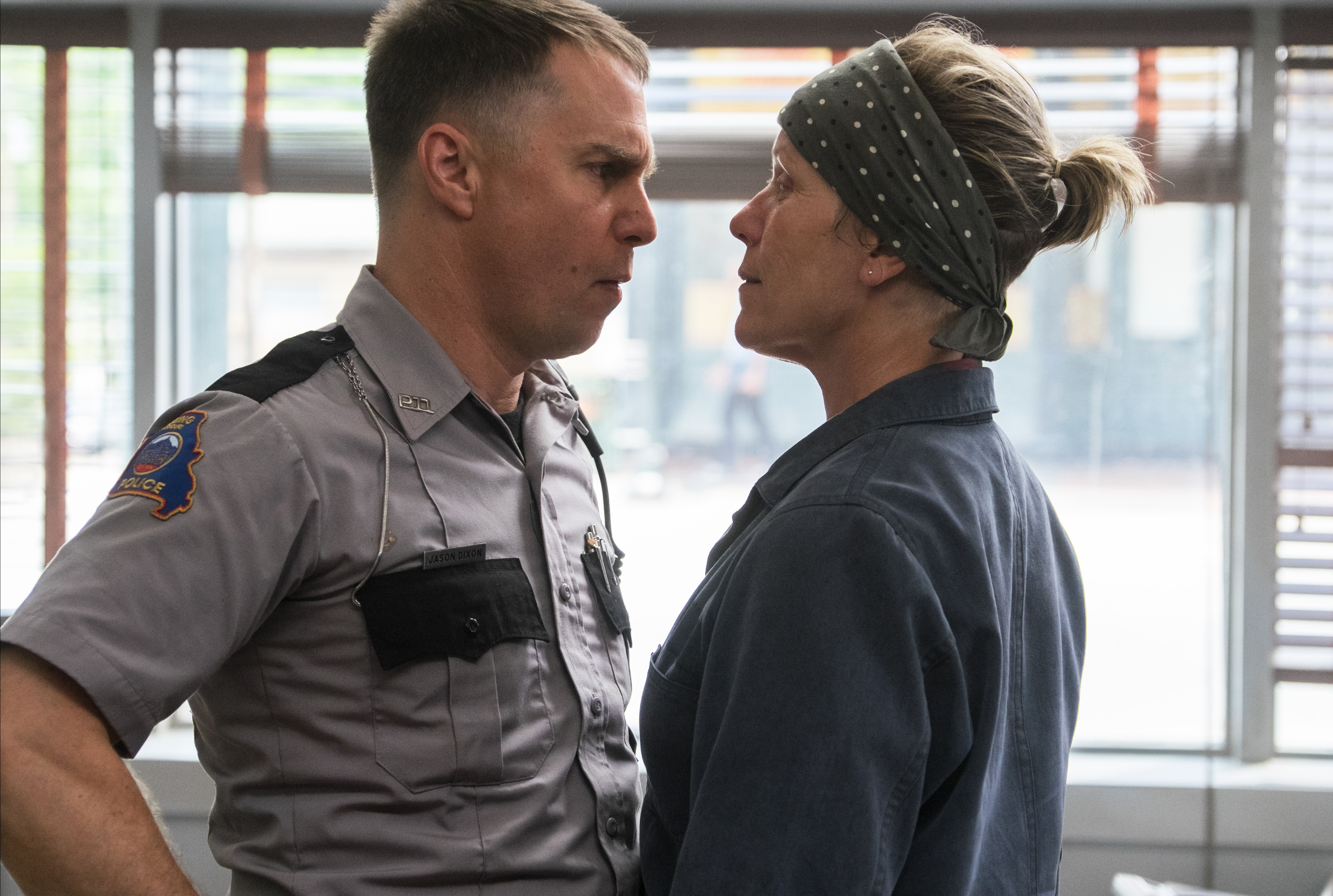Three Billboards and The Meyerowitz Stories prove that great casting makes great movies
They're not just stocked with familiar faces. They're stocked with the right familiar faces.


A free daily email with the biggest news stories of the day – and the best features from TheWeek.com
You are now subscribed
Your newsletter sign-up was successful
For nearly 20 years now, Sam Rockwell has been American independent cinema's secret weapon. He can play leads, or shine in glorified cameo roles. He's naturally funny, but excels in drama, and even genre films. With his rubbery frame, deep-set eyes, and sun-baked California drawl, the actor's wiry energy dominates any scene he's in. Wherever Rockwell's placed, he's perfect.
Rockwell gets one of the best roles of his career in writer-director Martin McDonagh's Three Billboards Outside Ebbing, Missouri (opening in select theaters on November 10), playing Officer Jason Dixon, a dimwitted small-town racist policeman. McDonagh is a Tony-nominated playwright whose previous films are the acclaimed In Bruges and Seven Psychopaths (the latter featuring another stellar Rockwell performance). He favors irony and ambiguity, like the killer with a bleeding heart, or the righteous soul who goes too far in the pursuit of justice. He and Rockwell turn Jason Dixon into one of the most confounding characters of the movie year. He's a man at once hilariously juvenile and genuinely dangerous, and the journey he takes from heel to near-hero in Three Billboards is a big part of what makes this film special.
But there's also this: Rockwell isn't even the star of Three Billboards. That honor goes to Frances McDormand, who's already been earning Oscar buzz for her turn as Mildred Hayes, the angry mother of a young woman who was raped and murdered about a year before the events of the film. As Mildred wages the titular publicity campaign to shame the local police — including Dixon — into investigating the crime, McDonagh and McDormand get into this lady's past as an abused wife and a notoriously ornery local character. Gradually, it becomes clear that she's as flawed as she is sympathetic.
The Week
Escape your echo chamber. Get the facts behind the news, plus analysis from multiple perspectives.

Sign up for The Week's Free Newsletters
From our morning news briefing to a weekly Good News Newsletter, get the best of The Week delivered directly to your inbox.
From our morning news briefing to a weekly Good News Newsletter, get the best of The Week delivered directly to your inbox.
It's rare to see two characters and two performances in a single film as multi-dimensional as Rockwell's and McDormand's. But Three Billboards doesn't stop there. John Hawkes is memorably unnerving in a small role as Mildred's violent ex. Caleb Landy Jones has a few striking moments as a gay local business owner. Peter Dinklage is downright heartbreaking as a barfly who's so smitten with Mildred that he goes out of his way to run errands for her. ("I like holding ladders; it takes me out of myself," he says while helping her put up her billboards.)
But the character who really ties the movie together is Sheriff Bill Willoughby, played by Woody Harrelson in yet another career-highlight performance. A genuinely good man who's dying of cancer, Sheriff Willoughby makes a fine foil to Mildred, and his unapologetic affection for Officer Dixon is an early tip that this bad cop might not be entirely worthless. (Willoughby's kind of the eternally patient Andy Taylor to Dixon's mean-spirited Barney Fife.) The title of Three Billboards Outside Ebbing, Missouri refers in part to the way that Mildred, Bill, and Jason each have big public fronts they put on, which don't necessarily represent who they are.
I bring up the casting in Three Billboards because it's one of the aspects of the film (along with the sparkling dialogue and complex storytelling) that stood out to me when I saw it at the Toronto International Film Festival earlier this fall. In my gig as a film critic, I watch a lot of indie films, and go to a lot of festivals. One bad trend I've noticed in the 2010s is something I'd call "over-casting." Too many mid-budget American movies feel the need to fill nearly every speaking part — no matter how negligible — with a familiar face. Rather than giving a newcomer a break, the producers throw a scene or two to a Saturday Night Live comedian on summer hiatus, or a semi-retired movie star that they can book for a few days.
These aren't real "ensembles," per se. They're seasoned professionals bought in bulk. And when I watch a lot of these movies, I find myself thinking about the cast not as the characters they play, but as the screen actors they are, cobbling together a living by filling up their schedules however they can.
A free daily email with the biggest news stories of the day – and the best features from TheWeek.com
But as someone who enjoys true ensemble films (like Spotlight, or State and Main, or pretty much anything by Robert Altman, Jonathan Demme, or Christopher Guest), I love it when McDonagh comes along and writes a richly populated film where an actor like Rockwell can make a meal out of a relatively small portion. Another recent example is writer-director S. Craig Zahler's brutal prison thriller Brawl in Cell Block 99 (currently available on VOD), where veteran character actors like Clark Johnson and Fred Melamed come in for a scene or two and absolutely crush it.
Noah Baumbach's The Meyerowitz Stories (New and Selected) is an even better case-in-point. The sprawling dramedy is available on Netflix, and ought to catch the eyes of the service's subscribers with its A-list cast: Dustin Hoffman as aging, under-appreciated New York sculptor Harold Meyerowitz, Emma Thompson as his scatterbrained wife Maureen, Ben Stiller as his successful "money manager to the stars" son Matthew, and Adam Sandler as his other, more sad-sack son Danny. But as with Brawl in Cell Block 99 and Three Billboards Outside Ebbing, Missouri, even the smaller parts in Meyerowitz are well-written and well-cast, with the likes of Candice Bergen, Adam Driver, Rebecca Miller, and Judd Hirsch making an impression with just a few lines.
The impressive casts of both Billboards and Meyerowitz aren't meant to show off the famous people that the filmmakers know. In both movies, the idea is to use these skilled, instantly recognizable actors to make the world of the protagonists feel more lived-in. In the former, Mildred's life in rural Missouri is defined by vivid, at-times-imposing characters played by Rockwell, Harrelson, and Dinklage. Stiller and Sandler's half-brothers in The Meyerowitz Stories are shaped by their opinionated, self-absorbed father; but veteran stars Bergen and Hirsch are just as essential to establishing that these two grown men have grown up around colorful, formidable men and women.
Baumbach has a gift for funny dialogue, and works plenty of quotable lines into The Meyerowitz Stories. But what puts this movie in the same league as the director's previous top-shelf efforts Frances Ha and The Squid and the Whale is that it uses its incessant chatter to define its central family. The Meyerowitzes tend to talk past each other, desperately touting their own accomplishments as a form of small-talk ... when they're not debating the merits and futures of the various New York sports teams, that is.
The unexpected MVP of The Meyerowitz Stories is the actor most likely to generate clicks from the average Netflix customer. Adam Sandler is so good as the sweet-natured, chronically unambitious Danny that, like McDormand, he deserves to be in this year's Oscar conversation. (Note: While Meyerowitz is a Netflix original, it had festival exposure and a limited theatrical release, which qualifies it for year-end awards. That said, I watched the movie on my home TV, and can confirm that it works just as well on the small screen.)
Placing a star as accomplished as Rockwell in a movie like Three Billboards is a smart but risk-free play. It's a lot bolder to trust a comic as typically broad as Sandler with a character as low-key and melancholy as Danny Meyerowitz. It means that Baumbach and his team have seen Punch-Drunk Love, Spanglish, and Funny People, and know there's a side of Sandler's screen persona that can drip with pathos without losing any of the popular comedian's offhanded humor.
The genius of hiring Sandler is evident in The Meyerowitz Stories' opening scene, featuring Danny and his college-aged daughter Eliza (played by rising star Grace Van Patten, so wonderful in another recent Netflix film, Tramps). As dad drives around the block, looking for a parking space with mounting agitation, the two generations of Meyerowitzes carry on a fast-paced, constantly shifting conversation about everything from Cindy Sherman to Lisa Lisa & Cult Jam. These two come across like a real loving father and amiable teenager, carrying around a lifetime of in-jokes — and appreciating each other's company even in a stressful situation.
It's the ultimate compliment to Sandler — and to the movie's casting director — that it's impossible to imagine anyone else playing the scene so magnificently.
Noel Murray is a freelance writer, living in Arkansas with his wife and two kids. He was one of the co-founders of the late, lamented movie/culture website The Dissolve, and his articles about film, TV, music, and comics currently appear regularly in The A.V. Club, Rolling Stone, Vulture, The Los Angeles Times, and The New York Times.
-
 What to know before filing your own taxes for the first time
What to know before filing your own taxes for the first timethe explainer Tackle this financial milestone with confidence
-
 The biggest box office flops of the 21st century
The biggest box office flops of the 21st centuryin depth Unnecessary remakes and turgid, expensive CGI-fests highlight this list of these most notorious box-office losers
-
 The 10 most infamous abductions in modern history
The 10 most infamous abductions in modern historyin depth The taking of Savannah Guthrie’s mother, Nancy, is the latest in a long string of high-profile kidnappings
-
 Walter Isaacson's 'Elon Musk' can 'scarcely contain its subject'
Walter Isaacson's 'Elon Musk' can 'scarcely contain its subject'The latest biography on the elusive tech mogul is causing a stir among critics
-
 Welcome to the new TheWeek.com!
Welcome to the new TheWeek.com!The Explainer Please allow us to reintroduce ourselves
-
 The Oscars finale was a heartless disaster
The Oscars finale was a heartless disasterThe Explainer A calculated attempt at emotional manipulation goes very wrong
-
 Most awkward awards show ever?
Most awkward awards show ever?The Explainer The best, worst, and most shocking moments from a chaotic Golden Globes
-
 The possible silver lining to the Warner Bros. deal
The possible silver lining to the Warner Bros. dealThe Explainer Could what's terrible for theaters be good for creators?
-
 Jeffrey Wright is the new 'narrator voice'
Jeffrey Wright is the new 'narrator voice'The Explainer Move over, Sam Elliott and Morgan Freeman
-
 This week's literary events are the biggest award shows of 2020
This week's literary events are the biggest award shows of 2020feature So long, Oscar. Hello, Booker.
-
 What She Dies Tomorrow can teach us about our unshakable obsession with mortality
What She Dies Tomorrow can teach us about our unshakable obsession with mortalityThe Explainer This film isn't about the pandemic. But it can help viewers confront their fears about death.
